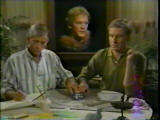 I hate agreeing with Harold Bloom. But what can I say? I fall easily and oddly and often (if sceptically) into Bloom’s spells of (particular) historical illumination and (annoying) lucidity.It’s hard to escape Bloom’s truth when he states that The Book of Ephraim, which begins James Merrill’s phenomenal long-long-long poem, The Changing Light at Sandover, is “an occult splendor in which Merrill rivals Yeats’ A Vision, [Wallace] Stevens’ ghostly The Owl in the Sarcophagus, and even some aspects of Proust.” Few poems can touch the dynamism of Merrill’s pun-tastic romp through a spirit world representing our entire emotional spectrum. I’ve especially fallen for Ephraim’s cattiness.
I hate agreeing with Harold Bloom. But what can I say? I fall easily and oddly and often (if sceptically) into Bloom’s spells of (particular) historical illumination and (annoying) lucidity.It’s hard to escape Bloom’s truth when he states that The Book of Ephraim, which begins James Merrill’s phenomenal long-long-long poem, The Changing Light at Sandover, is “an occult splendor in which Merrill rivals Yeats’ A Vision, [Wallace] Stevens’ ghostly The Owl in the Sarcophagus, and even some aspects of Proust.” Few poems can touch the dynamism of Merrill’s pun-tastic romp through a spirit world representing our entire emotional spectrum. I’ve especially fallen for Ephraim’s cattiness.

The spirit speaks to Merrill and his partner, David Jackson, through a Ouija board, sparking a kaleidoscope of communication with passed friends and fallen angels. For an experienced spirit guide, Ephraim is one caring, catty bitch, and I’d like to think that all of our otherworldly partners, doubles, and string-pullers have his text-messaging style humor (Merrill saw the future and it was gr8!) and melancholic wit (“AS WITH THE OLD LOVES ONE FORGETS A FEW,” “WE ARE NOT EVIL BUT IMPATIENT”).
Not one to waver (except for agnostically), Bloom also points us to Ephraim’s “daemonic force,” and calls Merrill one of the “strangest, the most unnerving of all this country’s poets.” Until I dove into The Changing Light, I’d written Merrill off as a rhymesayer. I don’t know why I didn’t encounter his longer work until a few years ago, but I didn’t. Now I’ve fallen for the daemonic cadences and quiet revelations of this 560-page epic whisper and cheer unlike anything you’ve ever read (unless you’ve read Shakespeare in a dream in an opium den overlooking your childhood home in an abandoned seaside town on the East Coast).

I won’t lie. I still haven’t finished the book, which includes the complete texts of The Book of Ephraim, Mirabell: Books of Number [sic], and Scripts for the Pageant, plus Coda: The Higher Keys. I keep backtracking and rereading the parts that hit me hardest, and I’ve been doing this for a few years, with the book always close to my bed. But hey, that’s why I love it. Maybe that’s its daemonic power. Maybe that’s why love is more daemon than demon. And maybe that’s part of Merrill’s message, his orgy with language and souls: don’t stop, don’t stop, please, don’t stop.
Check out these amazing film stills from the (never shown) film version of a stage version, proving no vision more impatient than another.



